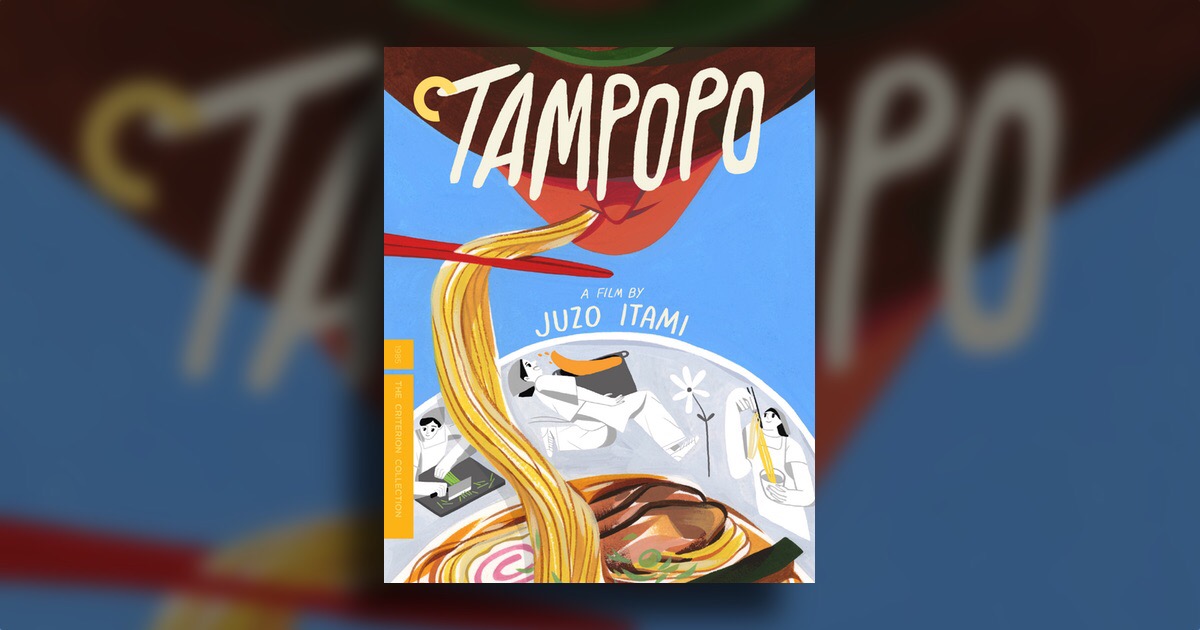
Wikipedia suggests the term “food porn” was coined by feminist critic Rosalind Coward in her 1984 book Female Desire, one year before the film to which it is still best applicable was released. Juzo Itami’s Tampopo is not solely made up of the sort of Instagram-ready, ornate cuisines with which we are inundated with today. Food is often mishandled, tossed off, or even not shown at all, even when it is the subject of the scene (which it often is). But the film expresses best – to borrow the title of another famous book – the joy of cooking, of eating, of considering one’s appetite and all that might fill it. And yes, one of its vignettes deals with a couple who has sex with food, so there’s that, too.
Centrally, the film is about a woman named Tampopo who owns and runs a ramen restaurant that isn’t very good. Inspired by a rough-and-tumble trucker to be better, she insists he mentor her until she has perfected her craft. And so, with an ever-growing crew of ramen-lovers, they go to work making her shop a destination. Along the way, Itami includes short vignettes exploring other avenues of food appreciation. While the main story is concerned with the labor involved in crafting good food, these short stories explore the erotic, financial, professional, familial, tactile, commercial, and cultural effects food has on people of various walks of life. One is about a young salary worker who knows way more about French cuisine than his superiors; another shows a woman work herself to death making dinner for her family. One is simply about an grocer chasing down an elderly woman who squeezes everything in the store. Did Mr. Whipple play in Japan?
While trying not to come off as too dense here, I sort of take food for granted. Not just in the privileged-American, constant-access-to-a-grocery-store-and-fast-food kind of way, but I don’t really get bent out of shape over a bad meal. Some are better than others, and the stuff’s mostly there to keep me alive. I eat for sustenance first, pleasure second (at best). Tampopo really brings into sharp focus how odd our relationship with food naturally is, how divorced we are from its source (the film, notably, deals not at all with farmers or butchers), and how sort of gross it is to shovel matter into our bodies, let alone as a means of pleasure. We constantly see food mashed, slurped, suckled, labored over. The film is at times unappetizing, even as it simultaneously rouses our awareness of how great food can be. Sort of like a lot of porn.
The notion of a “Criterion release” and what that entails has transformed a great deal over the years, to the endless fascination of us Criterion nerds along the way. Tampopo very much embodies the contemporary Criterion release – low on scholarly insight, heavy on production and cultural perspective, all presented in a brightly-colored, pop-y, appealing manner and package. To make the inevitable comparison, it’s an enjoyable meal, if slightly unfilling. The film itself is presented in a gorgeous 4K restoration that really has all the hallmarks you would expect from the company at this juncture. It’s sharp and clean and colorful and dense with texture and detail. Traces of damage are minimal, and I didn’t notice any of the dread compression artifacts we keep fussing over.
The supplements really express the flavor of the release. The best, to my mind, is a 90-minute documentary narrated by Itami about the making of the film. Here he can explore his regrets, his joys, and his memories of the experience, set to direct set footage of the scenes being prepared and shot. Which, sure, in a sense the film itself is as well, and the documentary makes for a perfect companion piece. He’s fairly open about how they achieved some shots, many of which don’t automatically suggest there’d be a trick involved, but which turn out to be quite complex. Whether incidental or not, he’s open to how demanding he can be on set, even towards his wife Nobuko Miyamoto, the film’s star. She’ll get the final word in a solo interview later on in the disc anyway.
Speaking of interviews, the other big highlight is a discussion with the film’s food stylist, Seiko Ogawa, who was in charge of not just making the endless bowls of ramen that parade through the film, but making sure each bowl did what it needed to do, narratively. As they try to craft a better bowl, Tampopo and Goro travel from restaurant to restaurant, each bowl having its own strengths – in some the broth is too thick or too thin, the noodles underwhelming, the pork insufficient. Each bowl Ogawa crafted helped tell the story.
Leading into that, we get a short featurette on ramen culture, how it went from a common pleasure to fine casual dining, with some vendors changing their menu daily to reflect fresh ingredients. Criterion being an American outfit, they focus on how Americans have interpreted the dish, but Japanese ramen scholar Hiroshi Oosaki guides the narrative, so it has its roots in the right place.
Tony Zhou and Taylor Ramos also contribute a short video essay on the notion of mastering one’s craft, and the importance of the amateur perspective on professional endeavors (something to which the CriterionCast family can relate); anyone who’s seen any of Zhou’s work will not be surprised that this is a very worthwhile ten minutes.
Last but not least, Criterion includes Itami’s 1962 short film, Rubber Band Pistol, which sets the stage for some of the Western-inspired aesthetics of Tampopo. It’s in very good shape as well.
As I noted, this is the very model of a modern Criterion release, but the form is also well-suited to this zippy, fun exploration of pleasure. In a way, that makes it sort of a perfect package. Criterion, too, is always mastering their craft.


